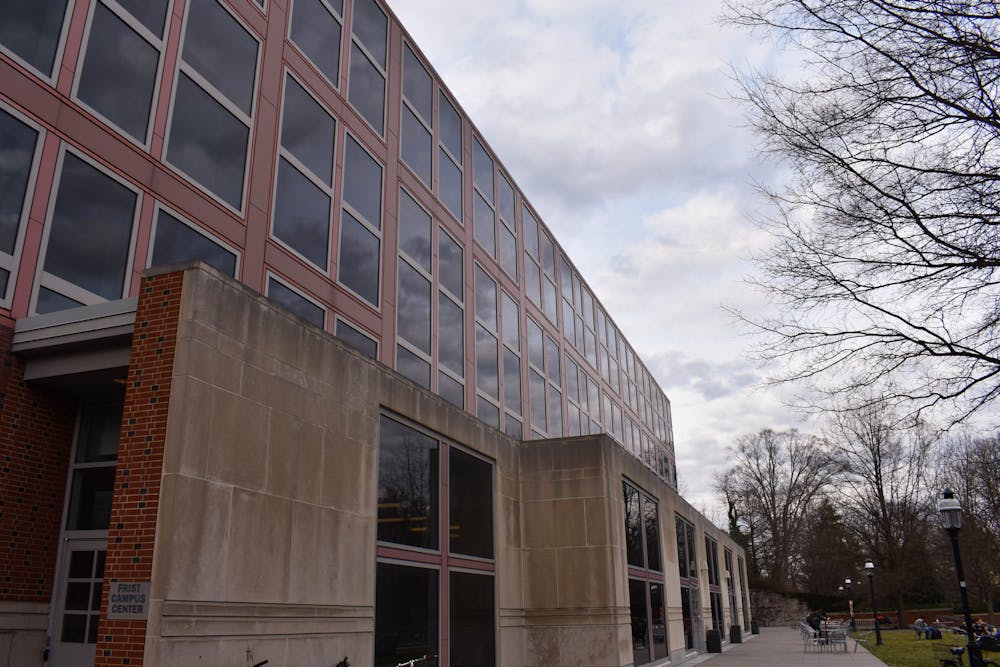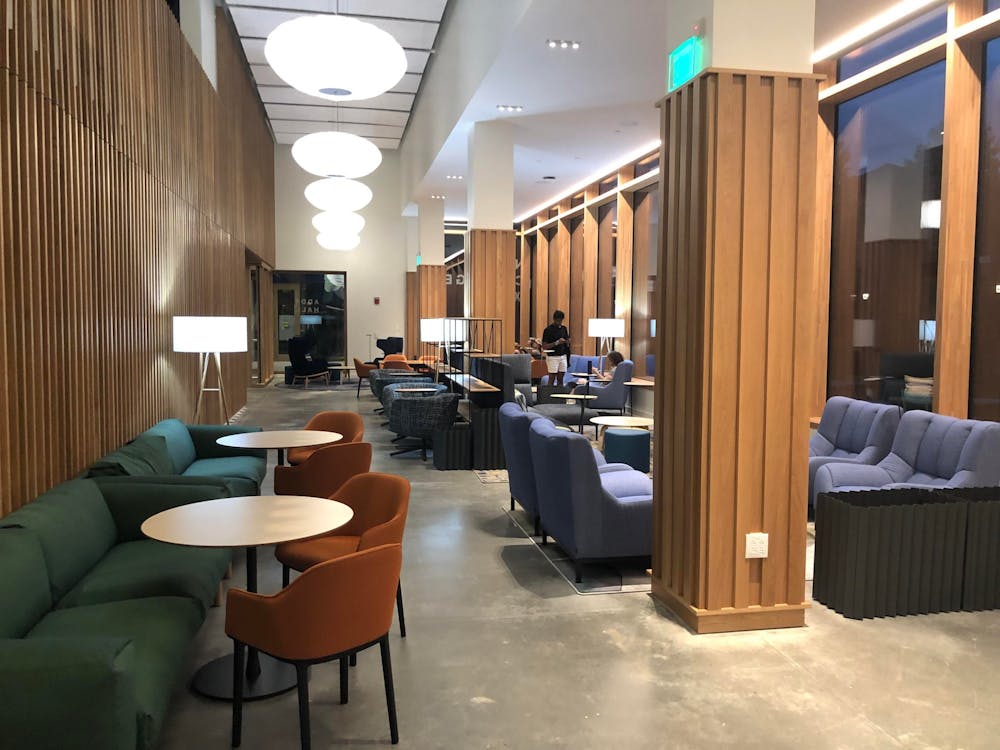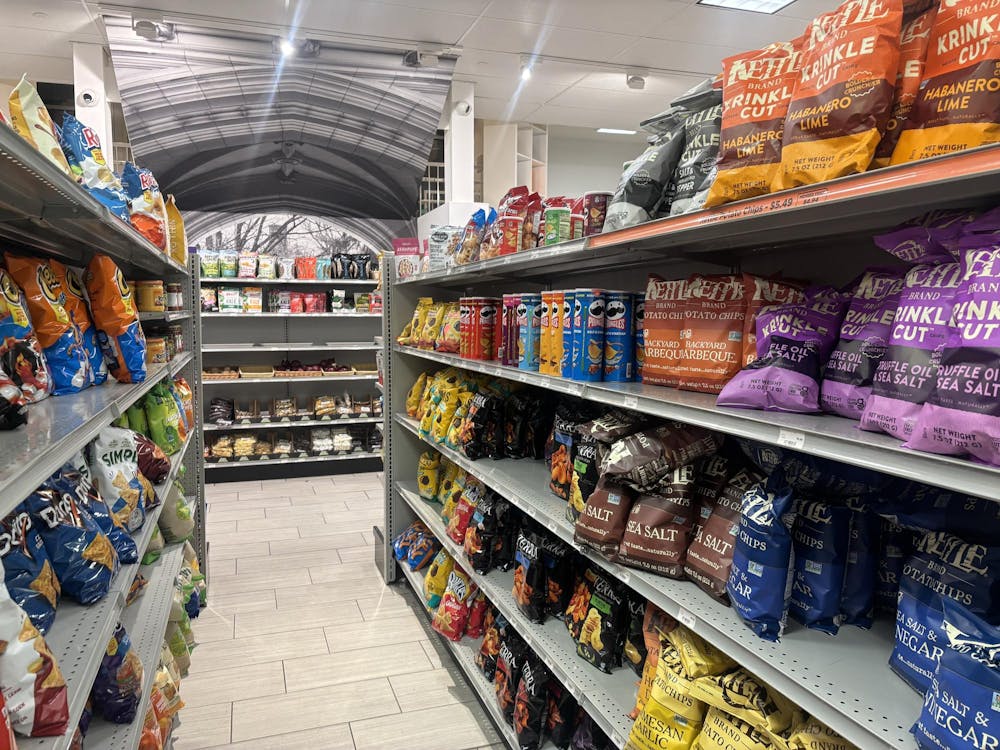The fall semester will be “fully in-person” with “no option for remote learning,” Dean of the College Jill Dolan assured around 300 students gathered for a virtual town hall on Monday.
Less than two weeks before first-years are scheduled to arrive on campus, administrators took the virtual stage to discuss the logistics of move-in, promise pre-pandemic dining hall norms, describe practices in the case of a student testing for positive COVID-19, confirm that grading policies will return to the pre-pandemic status quo, and much more.
Vice President for Campus Life Rochelle Calhoun struck an optimistic tone at the start of the presentation, sharing excitement about students’ imminent return to campus. Ensuring that return proceeds safely and in accordance with public health needs became the focus of the meeting.
“We’re still very much in the middle of a pandemic,” she said.
With the Centers for Disease Control recommending that vaccinated people in high risk areas wear masks indoors and in crowded environments, and reports of delta variant “breakthrough cases” — instances when fully vaccinated people become infected with the virus — dominating the news, students recently took to Tiger Confessions and other forms of social media to voice fears about the possibility of a return to the virtual classroom and the strict restrictions that dominated campus life in the spring.
Just four days prior to the town hall, moderated by Undergraduate Student Government President Christian Potter ’22, the University announced an adjustment to its COVID-19 guidelines. Administrators previously outlined a maskless semester, made possible by a vaccine requirement for both students and employees that allows for few exemptions.
However, as of Aug. 5, unvaccinated students and employees will be required to wear face coverings indoors, and those who are vaccinated will be “encouraged” to do so.
According to University Health Services Medical Director Melissa Marks, approximately 99 percent of students on campus will be vaccinated.

Calhoun reminded students at the meeting to submit proof of full vaccination to MyUHS prior to arrival on campus. Marks said that as of Monday, 220 undergraduates had yet to upload proof of vaccination to their MyUHS portals, approximately 4 percent of the student body. Dolan urged those students to submit their documentation immediately.
The overall message from Dolan on the semester’s plans was confident: Students should not anticipate “hybrid learning” at any point in their fall semester.
“There are no plans at this point to pivot back [to online instruction],” Dolan said.
Plans for students in quarantine

The vast majority of students will not have to quarantine upon arriving on campus, University officials reiterated at the town hall.
Only students who are not fully vaccinated and arriving from abroad will have to quarantine upon arrival, and an early move-in option was previously presented to allow students to complete their quarantines by the start of classes.
Students who test positive for the virus during the semester must isolate for 10 days in 1967 Hall, which has been designated for isolation. Those students will be provided with three delivered meals per day and, according to Dolan, will be assisted by residential college staff to “mitigate” the effects of missed in-person classes.
Dolan said administrators have instructed professors that “it’s a good idea for them to have lots of smaller assignments rather than one or two big ones, especially at the beginning of the semester so that students can establish a really strong attendance record before — God forbid — they should become sick or have to quarantine.”
In the case that a student contracts COVID-19 and becomes ill, Dolan said those situations would be handled “the same way we would in a regular semester for any other illness like the flu.”
If a student is not ill but in isolation due to a positive test result, residential college staff will assist in determining best practices to continue working remotely.
“It could be that other students in the class would be able to FaceTime them in, they could continue to do assignments on Canvas, that sort of thing,” Dolan said. “But I have to underline that we won’t have remote options for those students except perhaps informal ones, like a friend FaceTiming you in.”
Possibility of a mask requirement
There has been no change in the latest written guidelines with regard to masking, but administrators gave a window into the sorts of factors that might guide future policy.
Assistant Vice President of Environmental Health and Safety Robin Izzo said the possibility of a universal mask mandate on campus would be guided by campus-specific data, but also by statewide and countrywide developments.
“If we’re seeing that we are at that level that the CDC, for instance, is recommending masks for all, then that would be one reason for us to be considering masks for all,” Izzo said.
Calhoun clarified that part of the current mask “encouragement” has to do with giving fellow community members a sense of “comfort” in going about their daily lives.
“What we’re learning in the community is that there’s a level of comfort for others in the community when they think folks are sort of mutually taking responsibility for keeping the community safe,” she said. “And masking becomes one of the ways that people are feeling that level of comfort.”
Dolan left masking in classes, particularly large ones, on the table as a real possibility. “It could be that students will wear masks, especially in large lecture classes,” she said. “But all of that remains to be seen.”
Still, social distancing is “not a strategy we are considering right now,” Izzo said, adding that no limits on space occupancy are currently on the table.
Individual students’ vaccination statuses will also not be shared with their professors, Marks said.
Possibility of intervention measures
As for other potential intervention measures on campus, should positivity rates rise during the fall, Izzo did not pin down particulars.
When asked by The Daily Princetonian during the open forum about potential threshold case rates that would have to be met in order to see a return of restrictions, Izzo spoke of a team of scientists and physicians that meets each week to discuss the ongoing measures — and whether there is any need to evolve.
“Campus risk status is currently low and we hope that it stays that way for the whole semester,” she said, referencing the COVID-19 dashboard the University has maintained throughout the pandemic.
But at a “moderate” risk — meaning if cases are low, but there are multiple external data points suggesting that that “may not hold” — some mitigation strategies could come into play, she explained.
“Can we mitigate a particular cluster of cases?” Izzo said. “That might be more local, not something that’s going to apply across the campus, but maybe to a certain dormitory or certain group.”
Beyond that, “frequency of testing” could be “looked to” as a point for intervention, Izzo said, as well as “perhaps the way dining and those sorts of things happen.”
And, Izzo clarified, a temporary period of “hybrid learning” might become possible if cases rose dramatically and continuing to isolate infected students on campus became difficult or impossible.
Move-in logistics
First-year move-in is scheduled to begin on Aug. 21, according to the University website, and administrators at the town hall said there will not be limits imposed on the number of family members students can bring to campus to help them move in, as there were in the spring.
“We are not stipulating that only one person can help you,” Director of Housing Dorian Johnson said. “We’ve asked students to limit the number of people that they are bringing with them.”
Orientation events will for the most part occur in-person, Johnson said, adding he’s excited to welcome new students to campus “in a truly Princeton fashion.”
Parents helping their children adjust to dorm life are being asked to leave campus expeditiously, and unlike the “before times,” a phrase Dolan used during the town hall, will not be allowed to share a meal in the dining hall.
First-year family weekend, scheduled for the first weekend of October, will occur virtually to avoid the public health concerns of having hundreds, if not thousands, of students’ family members visiting campus.
Upperclass students, who are eligible to move in starting Aug. 28 at 12:01 a.m., according to Johnson, do not sign up for a move-in slot. Those students can arrive at any point between that date and the first day of class, hit their prox on a campus hotspot, and enter their dorm.
Grading and mental health
Dolan confirmed that the fall semester’s grading policy “will revert to our earlier grading policy” — meaning that students will no longer be able to take an unlimited number of classes Pass/D/Fail (P/D/F).
Still, Dolan is urging professors to “be compassionate” toward students as they navigate the transition back to in-person learning.
“We are encouraging faculty to just bear in mind the context that we’re all teaching and learning in,” Dolan said. “Many people are coming to campus for the first time. We have to give one another the benefit of the doubt.”
Calhoun said that “mental health, of course, continues to be one of our highest priorities,” responding to a student question that referenced the urgent mental health concerns that for some overshadowed the spring term.
“Counseling and Psychological Services will continue to do some telehealth work for students who prefer that way of accessing mental health appointments,” Calhoun said. “And of course there will be in-person opportunities as well.”
Unlike the spring term, this term’s week-long fall break will definitely not be shortened, Dolan assured participants.
Dining, eating clubs, guests
In what will come as a relief to those who knew and loved Frist Campus Center’s food offerings, Vice President for University Services Chad Klaus said “it is our plan to have Late Meal back.”
Klaus also said that dining halls are expecting to revert to a “pre-Covid set of offerings,” including both buffet-style meals and made-to-order opportunities.
“It is not our intention to have students taking food away from the dining halls fall semester, though again we will be monitoring closely with public health to see if that needs to shift at any point,” Klaus said, referencing the boxed lunches and dinners that were prevalent in the spring. “We hope to keep it as normal as possible this fall.”
Calhoun also confirmed that eating clubs will be open.
“They’ve been great partners with us,” she said of the upperclass student dining and social hubs. “They follow pretty closely any guidelines that are on campus.”
Guests who are not part of the University’s COVID-19 testing program will have limited access to campus, at least at the beginning of the semester, according to officials.
Any guest speakers that departments or student organizations may invite for in-person events will have to “attest to their own vaccination status,” according to Dolan.
The town hall took place via Zoom on Aug. 9 at 7 p.m. ET.








